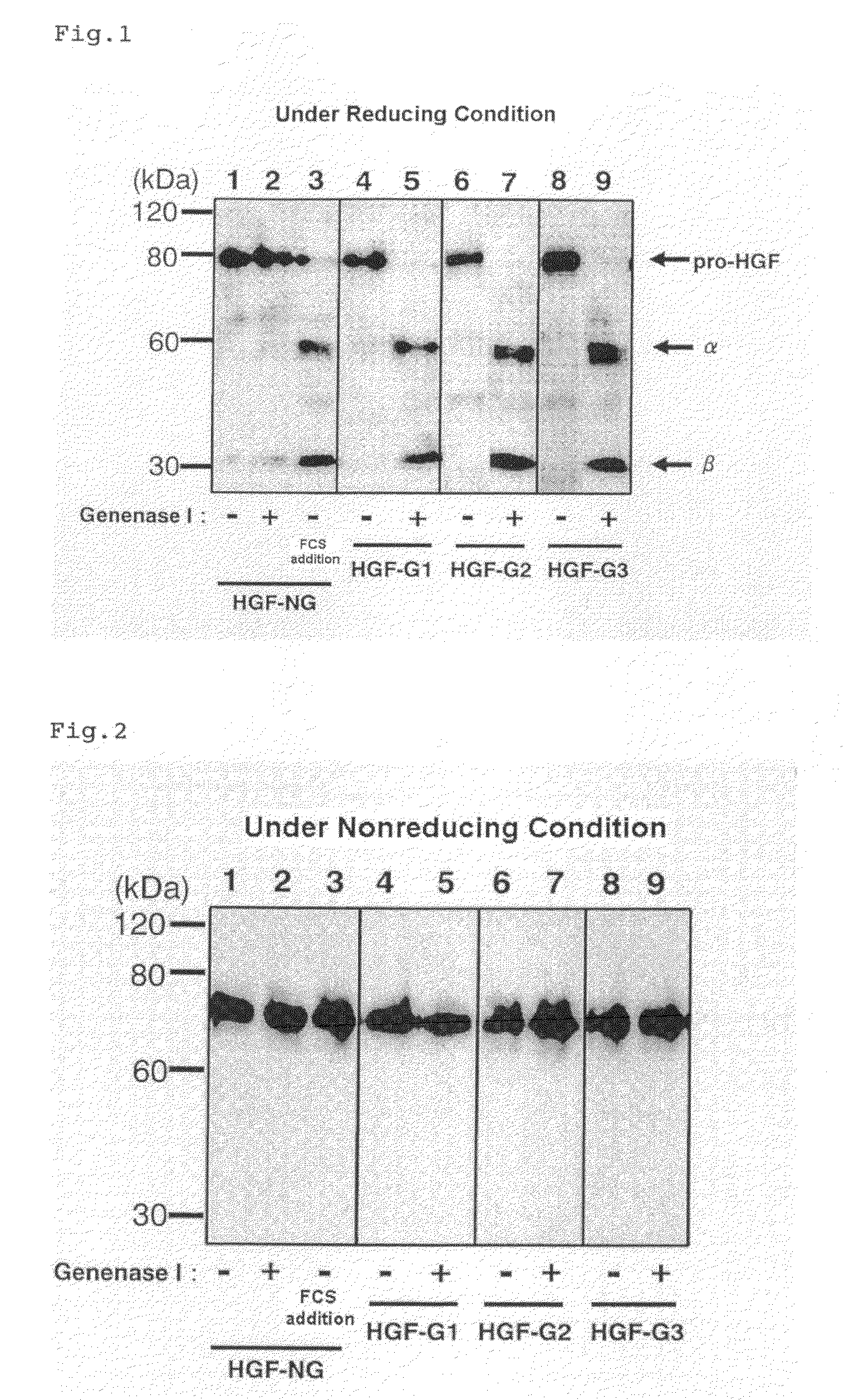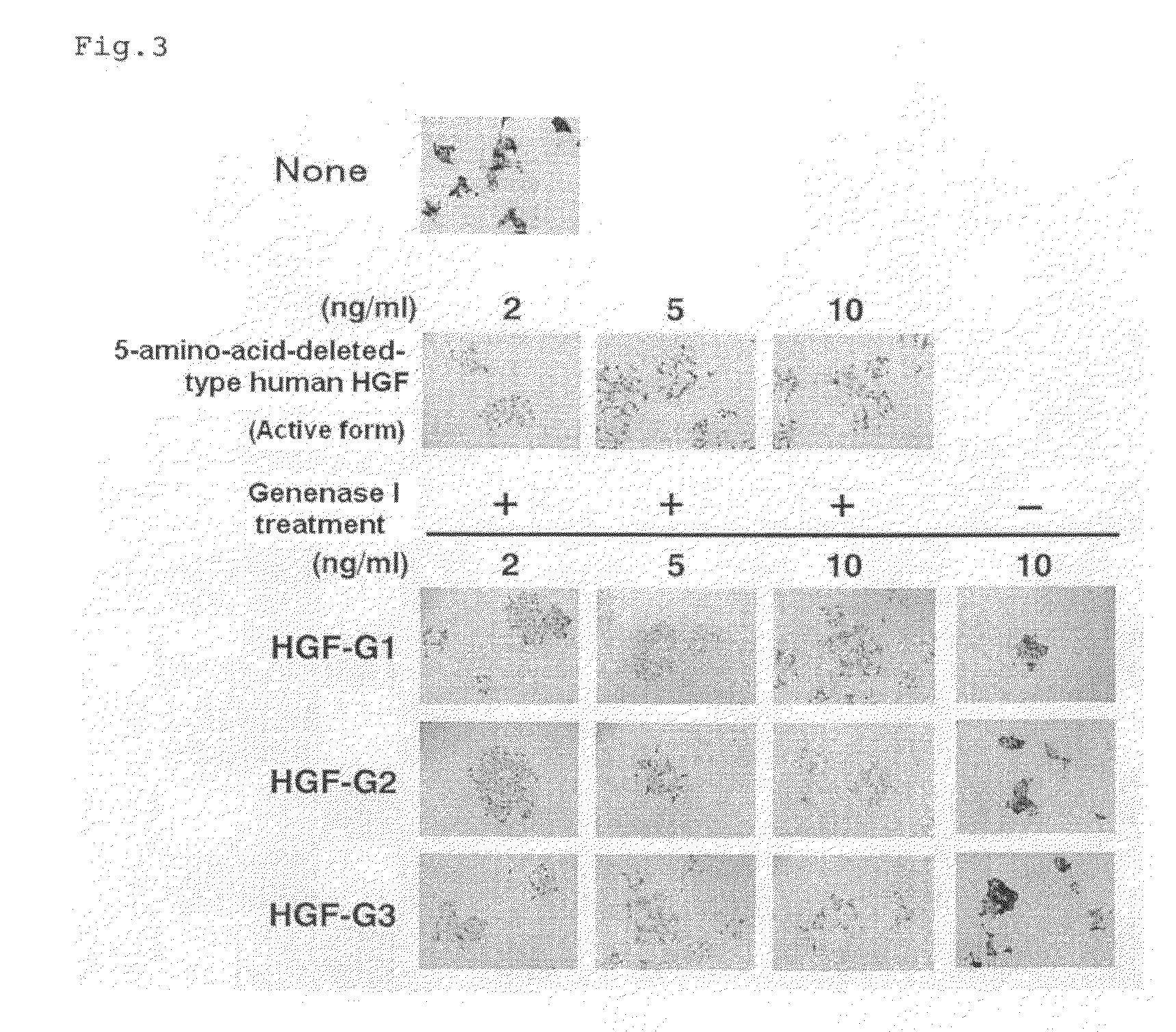HGF precursor protein variant and active protein thereof
a precursor protein and protein technology, applied in the field of hgf precursor protein variants, can solve the problems of difficulty in obtaining active hgfa, inefficient production of active hgfa, and inability to produce active hgf, so as to avoid the risk of contamination of abnormal prions derived from fetal bovine serum and low cost production
- Summary
- Abstract
- Description
- Claims
- Application Information
AI Technical Summary
Benefits of technology
Problems solved by technology
Method used
Image
Examples
example 1
[0112]To the both ends of the base sequence encoding the HGF represented by SEQ ID NO: 14 (5-amino-acid-deleted-type / glycosylation-deficient human HGF; HGF having a natural α chain-β chain boundary sequence Arg (489th)-Val (490th) and having a mutation at a glycosylation site; hereinafter referred to as HGF-NG) (SEQ ID NO: 15), a base sequence including BamHI recognition sequence (GGATCC) and a base sequence including XbaI recognition sequence (TCTAGA) were added, and this sequence was incorporated between the BamHI site and the XbaI site of pcDNA3.1 (+) vector (made by Invitrogen). The obtained vector is called pcDNA-dHGF-NG.
[0113]As variants having an introduced Genenase I recognition sequence (His-Tyr) at the α chain-β chain boundary of HGF-NG, a variant where the two C-terminal residues (Leu-Arg) of the HGF α chain were converted into His-Tyr (referred to as HGF-G1), a variant where the C-terminal residue (Arg) of the HGF α chain was converted into Tyr and the N-terminal residue...
example 2
[0125]The active HGF-G1 or active HGF-G3 prepared in Example 1 was subjected to SDS-PAGE under reducing condition, and transferred onto PVDF membrane. The protein transferred onto the PVDF membrane was stained with Coomassie Brilliant Blue, and the 30 kDa band corresponding to the HGF β chain was cut out. The sequence of the N-terminal amino acid was analyzed using an amino-acid sequencer (Procise 491 cLC made by Applied Biosystems). The N-terminal amino acid sequences of the bands thought to be the β chains of HGF-G1 and HGF-G3 were both VVNGI (Val-Val-Asn-Gly-Ile) (SEQ ID NO: 21). This confirmed that the HGF precursor protein variant to which a Genenase I recognition sequence was inserted was cleaved at the site of the Genenase I recognition sequence as designed.
[0126]
TABLE 2Amino-acid sequenceSequence listingHGF. . . CAKTKQLR↓VVNGI . . .SEQ ID NO: 14; 482 . . . 494HGF-G1. . . CAKTKQHY↓VVNGI . . .SEQ ID NO: 19; 482 . . . 494HGF-G3. . . CAPGAAHY↓VVNGI . . .SEQ ID NO: 20; 482 . . . ...
example 3
[0127]Canine kidney epithelial cells (MDCK) (Montesano R, et al., Cell, 66, 697-711 (1991))] were suspended in DMEM (containing 10% by volume of FCS) and plated into each well of a 24-well plate at 1×104 cells / well (480 μL / well). A test sample in an amount of 20 μL containing active 5-amino-acid-deleted-type human HGF, the active HGF-G1, active HGF-G2 or active HGF-G3 prepared in Example 1, was added thereto. After incubation at 37° C. for 20 hours, the presence or absence of scattering was observed with a microscope (FIG. 3). The test sample was prepared so as that the concentration of 5-amino-acid-deleted-type human HGF, active HGF-G1, active HGF-G2 or active HGF-G3 was 2, 5 or 10 ng / mL after 20 μL of the test sample was added to the medium.
[0128]None of HGF-G1 precursor protein, HGF-G2 precursor protein and HGF-G3 precursor protein to which a Genenase I recognition sequence was inserted showed cell migration action before Genenase I treatment (FIG. 3; −). After Genenase I treatme...
PUM
| Property | Measurement | Unit |
|---|---|---|
| pH | aaaaa | aaaaa |
| temperature | aaaaa | aaaaa |
| pH | aaaaa | aaaaa |
Abstract
Description
Claims
Application Information
 Login to View More
Login to View More - R&D
- Intellectual Property
- Life Sciences
- Materials
- Tech Scout
- Unparalleled Data Quality
- Higher Quality Content
- 60% Fewer Hallucinations
Browse by: Latest US Patents, China's latest patents, Technical Efficacy Thesaurus, Application Domain, Technology Topic, Popular Technical Reports.
© 2025 PatSnap. All rights reserved.Legal|Privacy policy|Modern Slavery Act Transparency Statement|Sitemap|About US| Contact US: help@patsnap.com


